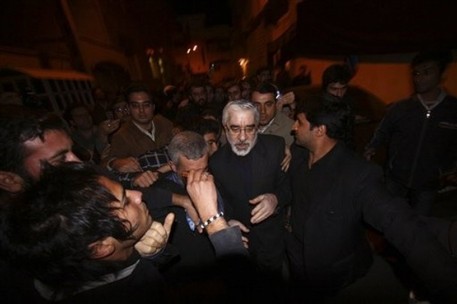
I take issue with bits from this New York Times op-ed by Flynt and Hillary Mann Leverett, but I nonetheless think they're asking the right questions:
'Those who talk so confidently about an â??oppositionâ? in Iran as the vanguard for a new revolution should be made to answer three tough questions: First, what does this opposition want? Second, who leads it? Third, through what process will this opposition displace the government in Tehran?In the case of the 1979 revolutionaries, the answers to these questions were clear. They wanted to oust the American-backed regime of Shah Mohammed Reza Pahlavi and to replace it with an Islamic republic. Everyone knew who led the revolution: Ayatollah Ruhollah Khomeini, who despite living in exile in Paris could mobilize huge crowds in Iran simply by sending cassette tapes into the country. While supporters disagreed about the revolutionâ??s long-term agenda, Khomeiniâ??s ideas were well known from his writings and public statements. After the shahâ??s departure, Khomeini returned to Iran with a draft constitution for the new political order in hand. As a result, the basic structure of the Islamic Republic was set up remarkably quickly.
'
The column eventually pitter-patters into the usual Leverett jargon, but on those three specific questions I'm in agreement.
Robin Wright attempts to supply the answers to those questions in referencing this manifesto from exiled Iranians such as Abdolkarim Soroush and Akbar Ganji. But these Iranians in exile are in exile for a reason; most of what they suggest is far more radical than anything being presented by Mousavi or other Green Movement figureheads. While they talk of freer elections, free press and the removal of the military community (i.e. the IRGC) from all realms of politics and economy, Mousavi modestly asks for electoral freedoms, freer press and freer speech.
One plan transforms Iranian society, the other brings it closer to the Iran of President Khatami. The difference is crucial, as the former is both ideal and unlikely, while the latter still allowed the regime to develop its nuclear weapons program.
UPDATE: I would add that while it's easy to poke holes in the weaker arguments in the Leverett op-ed, it might make for a more solid analysis if their critics would actually answer the three questions posed.
UPDATE II: The Leveretts respond to Dan Drezner.
(AP Photo)
